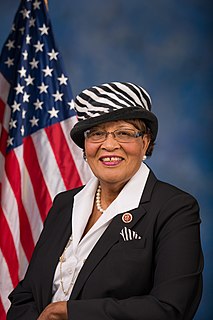A Quote by Eustace Mullins
A hastily written "Civil Rights Act" was rushed through Congress. President Andrew Johnson immediately vetoed it, noting that the right to confer citizenship rested with the several states, and that "the tendency of the bill is to resuscitate the spirit of rebellion".
Related Quotes
They came up with a civil rights bill in 1964, supposedly to solve our problem, and after the bill was signed, three civil rights workers were murdered in cold blood. And the FBI head, Hoover, admits that they know who did it, they've known ever since it happened, and they've done nothing about it. Civil rights bill down the drain.
Liberals say this over and over and over again to hide the actual history, which is why I go through the specifics on the big segregationists in the United States Senate, the ones who signed the Southern Manifesto and the ones who voted against the 1964 Civil Rights Act. There's a panoply of issues to consider. The first time they objected to the Federal government doing something was when it came to civil rights legislation. This is in stark contrast to the very few Republicans who voted against the '64 Civil Rights Act.
Germany doesn't have a Bill of Rights, England doesn't have a Bill of Rights, nobody else has a Bill of Rights. You know, the United States is very unique, and that is in the Bill of Rights and the fact that one third of the population is armed... nobody's armed in Canada, nobody's armed in England, nobody's armed in Germany, it's amazing, the United States is a really stand alone class act.
The Democrats co-opted the credit for the Civil Rights Act of 1964. But if you go back and look at the history, a larger percentage of Republicans voted for that than did Democrats. But a Democrat president signed it, so they co-opted credit for having passed the Civil Rights Act of 1964 and the Voting Rights Act of 1965.
[Before the Civil Rights Act of 1964], many governments in southern states forced people to segregate by race. Civil rights advocates fought to repeal these state laws, but failed. So they appealed to the federal government, which responded with the Civil Rights Act of 1964. But this federal law didn't simply repeal state laws compelling segregation. It also prohibited voluntary segregation. What had been mandatory became forbidden. Neither before nor after the Civil Rights Act were people free to make their own decisions about who they associated with.
The immigration bill - the new immigration bill - [Bill Clinton] has stripped the courts, which Congress can do under the leadership of the president, so that people who had a right to asylum or to petition - for asylum who were legal residents are now unable to go through because that part of the bill has been taken out.
The Civil Rights Act of 1964 was the most sweeping civil rights legislation of its day, and included women's rights as part of its reforms. Ironically, the section on women's rights was added by a senator from Virginia who opposed the whole thing and was said to be sure that if he stuck something about womens' rights into it, it would never pass. The bill passed anyway, though, much to the chagrin of a certain wiener from Virginia.
Contrary to the claims of the supporters of the Civil Rights Act of 1964 and the sponsors of H.Res. 676, the Civil Rights Act of 1964 did not improve race relations or enhance freedom. Instead, the forced integration dictated by the Civil Rights Act of 1964 increased racial tensions while diminishing individual liberty.






































